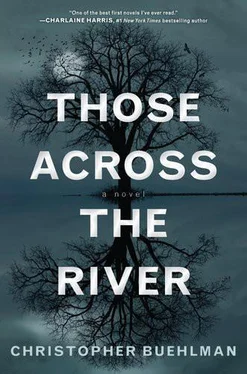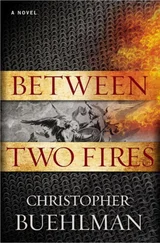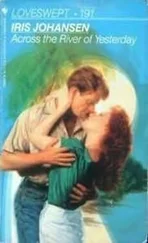Dora rarely cried but she did now.
“I want to leave, you have to take me home. I don’t understand what’s going on here but it’s so bad. Take me home, Frankie, anywhere.”
“I will. I promise.”
That was what I said.
Even though both of us knew it was too late now.
DO YOU KNOW him?”
“No.”
The sheriff stood with me on the porch in the cool of the morning.
I thought he looked grey and ill, and he was probably thinking the same thing about me.
“I’m supposed to take you in.”
I nodded.
“If the best explanation you got is that you shot an animal and in the morning it wasn’t.”
“Please don’t.”
“I don’t guess I will. A lot goin on I don’t comprehend. No animal I know could have done that at the Nobles, and no man neither.”
His voice faltered as he choked back a sob.
“What are you going to do with him?” I said, nodding towards the staircase inside. I had covered the two biggest parts of the naked man with sheets and towels. What was left of the back and shoulders suggested an acrobat. Small man, but strong. His face had been spared. He had an Irish look about him with his auburn hair and friendly cheeks and when I had thumbed his eyes shut he seemed to be frozen, laughing at the best joke he ever heard.
“Bury him in a potter’s field. I don’t know what else.”
“Shouldn’t somebody look at him? The other sheriff?”
“Ain’t nobody comin.”
“I don’t understand.”
“They said it’s our bed to lie in and they won’t come.”
“What about… I don’t know, the FBI?”
“You want to tell your story to the FBI? The wolf-man story? They’d lock you up in a sanatorium and then lock me up for not lockin you up. I need time to think. About everything. It’s too much.”
“I know.”
“I guess you do. How is she?”
“Dr. McElroy stitched her and put ointment on her for infection. He’s worried about that because the bite’s so deep.”
“I hope you put something on that eye, too.”
I nodded. He meant my eyebrow, which had swollen up badly. The night before I had noticed it hurting and found a dime-sized piece of pine from the Noble’s door wedged under it.
“Did he want her in the hospital?” he asked.
“He said that hospital’s only good for dying. You go in for a hernia and never come out.”
“That’s about right. But he sent poor Ursie there. Oh my Jesus.”
That half-choked sob came out of him again.
He put his hands on his hips and bent forward at the waist, trying to collect himself. I put my hand on his back, and as soon as I felt the warmth of his skin through his shirt, the gesture seemed invasive and awkward. I withdrew it and he stood up.
He reached for a tin in his shirt pocket and put a pinch of tobacco in his mouth.
“We’re leaving town,” I said.
“Maybe me, too. Let’s see about movin him off your stairs.”
IN THE PICTURES, gangsters spray bullets and the victims shut their eyes and fall asleep. Killing isn’t like that, of course. I found that out pretty young. But killing someone in your house is different from doing it on a battlefield. On the battlefield, you might have to throw a body into a shell hole, or hide behind one, or share a trench with one until the shelling stops, but that’s it. When it happens in your house, you have to clean it up. All of it. And then you have to keep living there.
It was a huge, awful fucking mess. Endless pieces of bone and tissue on everything, endless pumping at the well. I scrubbed the walls and floor until my hand and arm were numb, except for the hot pain where the flash had burned the back of my hand raw.
But the floors and walls.
I thought the sponge would run pink forever.
When that was finally done and the sheriff and Lester came by for the dead man, I drove into town to get supplies. Estel gave me the keys to the hardware store and told me to take what I needed and not to worry about paying.
As I drove, I passed the carpenter’s house and saw him hammering in his open work shed. The whole town could hear it. Everyone knew it was for caskets.
When I got back home, I was grateful to do a different kind of work. It was easier to strip burned wallpaper and board up windows and dig warped nickels out of the wall than to do what I had done before. And it was better to work than to sit and think.
Between tasks I saw to my wife. Once the downstairs was clean, I sat her pillow-propped on the couch and fixed the bed, then carried her back upstairs warm and dreaming in my arms.
Anna Muncie, the teacher of the younger grades, came over with cookies for Dora. Anna’s face was swollen from crying. Dora did not have much appetite nor did she speak much, but Anna sat with her while I worked and then near dusk she made a dinner that she herself ate most of.
When it was time for bed, I left a candle burning in a glass bowl and I set my pistol on the nightstand. Dora slept quickly. I watched her breathing for several hours before I, too, succumbed and entered yet another troubled sleep.
I DREAMED ABOUT the trench fight, only this time when the German boy ate my fingers sitting in the mud with me, he then ate my hand up to the wrist, got up and left me in the mud. Soon stretcher bearers fetched me, all suited up in gas masks, and hauled me to Chicago, on Halstead, I think, near a manhole that was also like the door to an oven. It was Hell. They wanted me to jump in since it was against the rules for them to push me. I refused. They explained that they had no place else to go and they were quite willing to wait. I remember the fire reflected in the eye plates of the mask. I remember the heat from the open hole.
It was from this stalemate that I awakened and found the sheets damp.
Dora was as hot as a brazier.
“Dora?”
She moved her face back and forth a little. I held my hand to her forehead and frowned.
“Eudora.”
She made a small noise in her throat and then opened her eyes halfway.
I gave her water to drink. I made her take aspirin. Three of them. I put damp towels on her head and neck and she warmed them up so fast I spent half an hour doing nothing but wringing and replacing and fetching more cool water in a pan. Through all of this, she watched me with moist, cloudy eyes. Moonlight lit her face and she looked so beautiful I was afraid she was about to die, like in some painting of a saint’s death.
“Honey, how are you feeling?”
“Foggy. Froggy. Not good. Heel itches.”
I sat up and watched over her while she slept the night through. When I finally began dozing, it was not yet light, but somebody’s roosters had started anyway.
That morning I sent for Dr. McElroy, who put a thermometer in her mouth, then hissed when he read it. He offered to ring the hospital to tell them she was coming, but she sat up in bed and refused.
“Mrs. Nichols, your temperature is so high I’m surprised you’re lucid.”
“I heard what was said about that hospital. I’m not going.”
“How do you feel?”
“Bad. But not as if I’m going to die.”
“Light-headed.”
“Yes. Exactly what was my temperature?”
“Maybe I got a bad reading. I’m going to take it again.”
He did.
“Well?”
He paused before he spoke.
“You may not feel that poorly, but I believe that you may die.”
“Then I’m not going to do it in a hospital.”
“That hospital being what it is, I am disinclined to argue. I’ll do what I can for you and pray about the rest. Let me change the dressing and get a look at that heel. With this much fever, I’m sure it’s gone septic.”
Читать дальше












